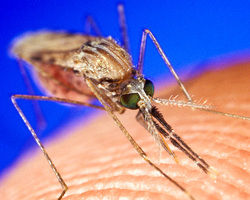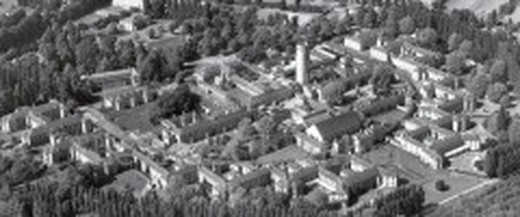 In 1975 a simple ceremony was held at the Horton Hospital in Epsom. A plaque was unvieled commemorating the contribution made between 1925 and 1965 towards the "relief of suffering". The building housed the Mott Clinic also known as the Horton Malaria Laboratory. It was here, before the discovery of penicillin, that malaria infected mosquitos were used to treat patients with syphilis. In Vienna at the end of world war one Professor Wagner-Jauregg dicovered that malaria-induced fever was effective in the treatment of the syphilitic condiiton General Paralysis of the Insane (GPI). GPI was a serious problem affecting about 10% of patients in psychiatric hospitals and there was until that time no effective treatment. The malaria therapy was reported to result in over 80% of patients were free of disease progression. The treatment was introduced rapidly into England but there was lack of awareness of the lethal effects of certain species of human malaria parasites such as Plasmodium falciparum. Horton was chosen to treat these patients because after a pilot study at Cane Hill and Claybury hospitals they found that there was a high risk that malaria would spread between patients; Horton was ideal because of the fourteen bed isolation hospital and so to try and render the treatment as safe as possible the Mott Clinic and Horton Laboratory was established. Colonel S. P. James, was the first director and he found a strain of malaria in Madagasca that was safe for use in man. In May 1925, mosquitoes infected with this strain were taken to Horton and fed on two female patients.The function of the laboratory was to provide malaria parasites use in the treatment of GPI and this continued until penicillin made the treatment obsolete. Overall the clinic provided treatment for thousands of patients sufferering from GPI with more than 16,000 treated in Horton Hospital itself. A stream of publications appeared in scientific journals originating from the Horton Laboratory including the discovery of the exoerythrocytic parasite in the liver in man in 1948. The laboratory moved into the testing synthetic antimalarial drugs in conditions of maximum secrecy during the second world war. The laboratory closed in 1973 and its memorabilia and archives are held at the Wellcome Museum and the London School of Hygiene and Tropical Medicine. Epsom and Ewell Archives
0 Comments
Your comment will be posted after it is approved.
Leave a Reply. |
Dr Richard BogleThe opinions expressed in this blog are strictly those of the author and should not be construed as the opinion or policy of my employers nor recommendations for your care or anyone else's. Always seek professional guidance instead. Archives
August 2023
Categories
All
|

 RSS Feed
RSS Feed

